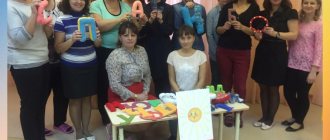Workshop for teachers “Communication between teachers and parents of students”
Municipal preschool educational institution "Kindergarten No. 290 of the Dzerzhinsky district of Volgograd." Speech at the pedagogical council of municipal educational institution kindergarten No. 290 “Kindergarten, me and my friendly family” on the topic:
Workshop for teachers “Communication between teachers and parents of students”
Compiled by: social teacher of the first qualification category Olga Borisovna Moiseenko
Goal: to increase the level of professional skills of preschool teachers in matters of interaction with the families of pupils.
Plan:
1. “Organization of joint work of a teacher with parents of students” 2. Results of a survey of teachers and parents. 3. Completion of tasks by teachers. 4. Homework for teachers. 5. Memos for teachers on communication with parents of students.
“Organization of joint work between teachers and students’ parents”
Teachers and parents have common tasks: to do everything so that children grow up happy, active, healthy, cheerful, sociable, so that they become harmoniously developed individuals. Modern preschool institutions do a lot to ensure that communication with parents is rich and interesting. On the one hand, teachers preserve everything that is best and time-tested, and on the other hand, they look for and strive to introduce new, effective forms of interaction with the families of pupils, the main task of which is to achieve real cooperation between the kindergarten and the family.
Practice shows that any joint activity of parents and teachers is effective. For example, a collective discussion of a problem allows parents to feel that other mothers and fathers also faced similar problems and managed to find a way out of them. And this gives rise to the feeling: any difficulties can be solved.
There are many difficulties in organizing communication with parents: this includes parents’ lack of understanding of the importance of the kindergarten regime, its constant violation, and the lack of unity of requirements in the family and kindergarten. It is difficult to communicate with young parents, as well as with parents from dysfunctional families or those with personal problems. They often treat teachers condescendingly and dismissively; it is difficult to establish contact with them, establish cooperation, and become partners in the common cause of raising a child. But many of them would like to communicate with teachers “on an equal footing,” as with colleagues, to achieve trusting, “heartfelt” communication. Who plays the leading role in organizing communication? Of course to the teacher. To build it, it is important to have communication skills, navigate the problems of education and the needs of the family, and be aware of the latest achievements of science. The teacher must make parents feel competent and interested in the successful development of the child, show parents that he sees them as partners and like-minded people.
A teacher who is competent in the field of communication with parents understands why communication is needed and what it should be, knows what is necessary for communication to be interesting and meaningful, and, most importantly, actively acts.
Many teachers have difficulty communicating with parents of students. Some people believe that parents are to blame for everything, who do not care about children and their development, who do not want their child to grow up good. It’s difficult to agree with this. Parents do not always have enough time to communicate, there are also categories of difficult parents, but something else is important. Teachers need to see the reasons for difficulties - not only in parents, but also in themselves. This leads to the conclusion: we need to constantly work on the professional competence of teachers in communicating with parents.
We will devote today’s workshop to this issue: Communication between the teacher and the parents of the students.”
Based on the results of the survey, all kindergarten teachers believe that close cooperation with parents on issues of raising and educating children is necessary. Some teachers have difficulty communicating with parents. The reason for this is considered to be: parents’ reluctance to make contact, parents’ incompetence in matters of raising and educating children, parents’ personal problems, families who do not consider it necessary to communicate with teachers.
Working with a family is hard work. It is necessary to take into account the modern approach to working with families. The main trend is to teach parents to independently solve life problems. And this requires certain efforts from teachers. Both the teacher and the parent are adults who have their own psychological characteristics, age and individual characteristics, their own life experience and their own vision of problems. Our seminar is dedicated to increasing the level of professional skills in matters of interaction with the families of pupils.
And now I suggest you complete the following tasks.
So, the first task: I suggest you answer the following questions:
1. Who plays the leading role in raising a preschool child? (family)
2. Name the legislative documents that indicate the priority role of the family in raising a child (Constitution of the Russian Federation, Law “On Education”, Convention on the Rights of the Child, Family Code)
3. What is the role of other social institutions in raising children? (help, support, guide, supplement the educational activities of the family)
4. What is the teacher’s competence in communicating with parents? (improves his knowledge, strives for active interaction, is attentive, self-possessed, tactful in communication, has knowledge about the family, takes into account the social needs of parents, knows how to plan work with parents, has communication skills)
5. In what areas of knowledge should a teacher be competent to fully communicate with parents? (medicine, pediatrics, physiology, psychology, pedagogy, rhetoric, etc.)
6. What are the conditions under which a teacher’s competence may decrease? (restrictions on the part of the body (decreased performance due to age-related reasons, diseases), insufficient motivation for activity, lack of awareness)
7. What are the conditions for overcoming loss of competence? (help from colleagues, mentors, creating motivation for activity, reading literature, magazines, seeking help from a psychologist, advanced training courses, participation in problem-based seminars)
8. What are the methods for studying the family? (questionnaire, testing, conversation, patronage, observation of the child’s play activities, “Parental essay”, diagnostic drawing methods, etc.)
9. What are the forms of working with families? (parent meetings, surveys, written and oral consultations, conversations, open days, parent mail, design of stands, invitations to classes, general leisure activities with the invitation of parents).
Next task: psychological pause. Now you will draw out strips with written tasks. After reading what is written, you must depict it.
Shame, resentment, sadness, disappointment, joy, surprise, curiosity, anger, pride, arrogance, fear, grin, dissatisfaction, interest, complacency.
Solving pedagogical situations. I offer you a conflict situation, and you must find a way out of it.
— a mother complains to the teacher that her child comes home from kindergarten bitten;
- parents bring an obviously undertreated child to kindergarten without a medical certificate and demand that you accept the child, because they simply have nowhere to take the child. You need to politely and tactfully explain to the parents that you cannot accept such a child;
— a mother complains to the teacher that her child comes home from a walk in dirty clothes;
— Mom comes to the teacher for advice: we have a second child in our family. How to help an older child adapt to the arrival of a baby?
Next task: an exercise to develop the teacher’s communication skills. One of you pulls out a strip with the image of a parent written on it. You need to portray this image and let the rest guess.
Prepare a short commentary on the abstract.
Now you are drawing out a strip with a thesis statement and you need to prepare a short commentary for it. Express your opinion whether you agree with this statement or not and why.
Abstracts:
- You cannot immediately begin the subject of conversation if it is unpleasant for your parents.
- In the process of communication, the teacher must accept the principles of education and styles of family relationships that parents offer.
- The teacher should show more restraint in expressing a positive opinion about parents as communication partners than parents about teachers.
- If you see the other person's face without a smile, smile at him yourself.
- Confidential communication between the teacher and the parents of the pupils cannot be imposed; it must arise as a natural desire of the other party.
- The predominance of an evaluative communication style becomes a serious source of conflict between the teacher and parents.
- When the self-esteem of one of the interlocutors is hurt, the communication itself certainly suffers.
- Parents need to hear what the teacher told them.
"Bank of Ideas". I invite all participants to replenish the bank of ideas: how to make communication with parents the most productive and enjoyable?
Summing up the results of the “Business Game”.
Preschool age is characterized by a close emotional attachment to parents, especially to the mother, not in the form of dependence on her, but in the form of a need for love. The child is not yet able to understand the cause of conflicts between parents and does not have the means to express his own feelings and experiences. Therefore, quarrels between parents are perceived by the child as an alarming event, and the child tends to feel guilty about the conflict. Frequent quarrels between parents in preschool children can become a source of mental illness. The best preventive measure can be a good relationship between parents and children, parents’ understanding of the inner world of their child, his problems and experiences, and the ability to put themselves in the shoes of their children. There are no ready-made parenting recipes that you can take and apply to your child. Some recommendations can be given. As homework, I suggest you offer some parenting tips for parents. In what form you do this is your choice. The most important thing is that the form you choose is the most effective. And at the next seminar we will discuss why you chose certain forms and how effective they turned out to be.
Who plays the leading role in organizing communication? Of course to the teacher. To build it, it is important to have communication skills, navigate the problems of education and the needs of the family, and be aware of the latest achievements of science. The teacher must make parents feel competent and interested in the successful development of the child, show parents that he sees them as partners and like-minded people. And in conclusion, I would like to give some recommendations to teachers in communicating with parents of students:
- Always strive to be in a good mood and be pleasant to talk to.
- Try to feel the emotional state of the parents.
- Finding an opportunity to tell parents something positive about the child every time is the best way to win parents over.
- Give parents the opportunity to speak without interrupting them.
- Be emotionally balanced when communicating with parents, set an example of good manners and tact.
- In a difficult situation, try to set an example of compliance - this cannot damage your dignity, but you can strengthen it.
- Let us remember the Japanese proverb: “A bad owner grows weeds, a good owner grows rice.” The smart one cultivates the soil, the far-sighted one educates the worker.” Let's raise a worthy generation. Good luck to you!
![Literacy lesson in the preparatory group “Sounds [K[-[K'] and the letter K”](https://properbooks.ru/wp-content/uploads/zanyatie-po-obuchenii-gramote-v-podgotovitelnoj-gruppe-zvuki-k-k-330x140.jpg)

